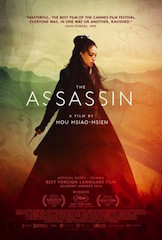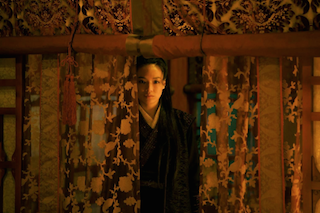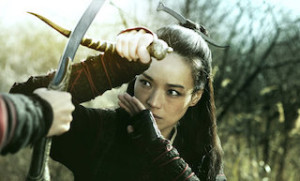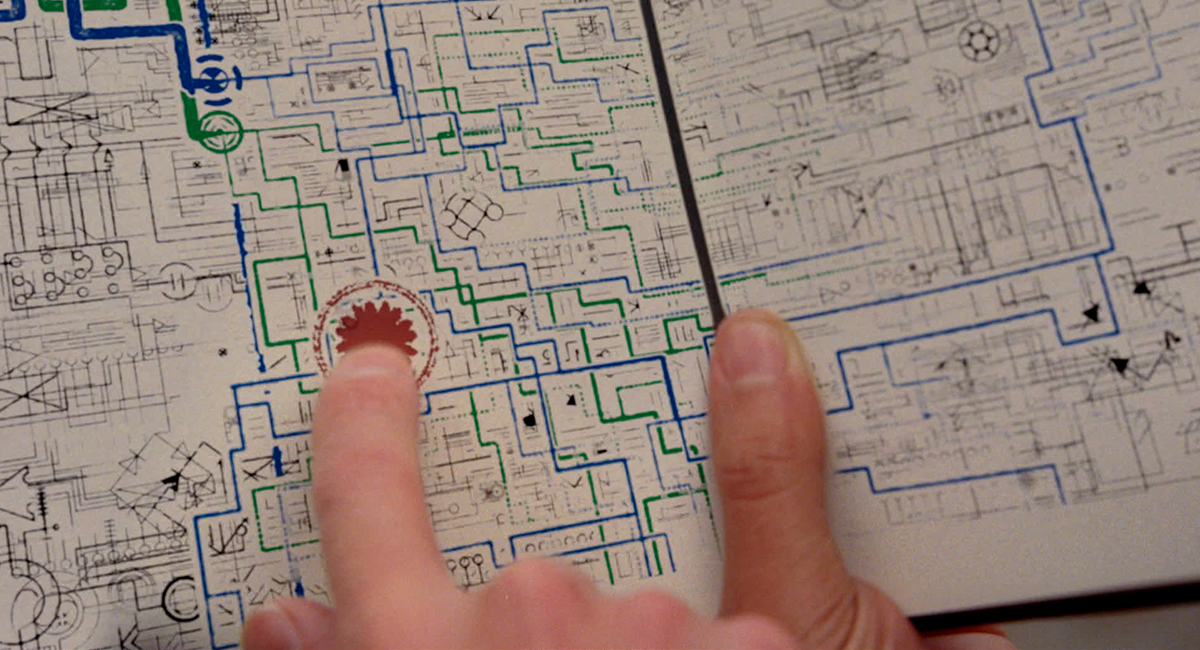 The wuxia genre has long been an important part of Chinese culture. While traditionally associated with literature, telling the adventures of martial artists in ancient China (the word “wuxia” means “martial hero”), like many forms of story-telling they have made their way to the cinema. While Chinese cinema has largely not made its way into the mainstream imaginations of American culture, Hollywood audiences may be more familiar with the genre since Ang Lee’s 2000 movie Crouching Tiger, Hidden Dragon. While being a sleeker, more Western-friendly take on the genre, Lee’s Oscar-nominated film paved the way for Zhang Yimou’s fabulous Wuxia films: Hero and House of Flying Daggers. It also made possible for DreamWorks to greenlight and develop the Kung-Fu Panda series of movies, which have been very successful and well-received in China as a reverent and exceptional contribution to the genre.
The wuxia genre has long been an important part of Chinese culture. While traditionally associated with literature, telling the adventures of martial artists in ancient China (the word “wuxia” means “martial hero”), like many forms of story-telling they have made their way to the cinema. While Chinese cinema has largely not made its way into the mainstream imaginations of American culture, Hollywood audiences may be more familiar with the genre since Ang Lee’s 2000 movie Crouching Tiger, Hidden Dragon. While being a sleeker, more Western-friendly take on the genre, Lee’s Oscar-nominated film paved the way for Zhang Yimou’s fabulous Wuxia films: Hero and House of Flying Daggers. It also made possible for DreamWorks to greenlight and develop the Kung-Fu Panda series of movies, which have been very successful and well-received in China as a reverent and exceptional contribution to the genre.
Hsiao-Hsien Hou’s take on the wuxia film, 2015’s The Assassin, is unlike these more popular 21st-century adaptations and has more in common with the movies that have long been held as the greatest of the genre. It steeps itself in beautiful, stunning natural settings—utilizing the cinematography of frequent collaborator Ping Bin Lee—that recall the beauty of the most influential Chinese wuxia film, King Hu’s A Touch of Zen, a film Ang Lee has cited as a major influence on Crouching Tiger, Hidden Dragon.
It also has a much more challenging and obfuscating narrative, as well as a rich emotional palette recalling the gorgeous and passionate Wong Kar-wai film, Ashes of Time. Again, Ping Bin Lee has a hand in this element as a previous collaborator with Kar-wai on the widely regarded 2000 film, In The Mood For Love. While Hou’s Assassin chooses a more controlled, measured pace than Ashes of Time and is hardly the impressionistic spectacle of Kar-wai’s wuxia vision, it shares the similar elliptical narrative, leaving many viewers confounded to piece together character motivations and a deliberate narrative.
Admittedly, the movie’s plot elements can be difficult to decipher. However, the story is fairly straight forward upon further reflection yet, it may be difficult to comprehend on an initial linear viewing. Taking place in Northern China during the 8th century, Nie Yinniang (Qi Shu) is a young woman trained by a nun in martial arts and turned into a deadly and skilled assassin. The movie opens with Yinniang completing an effortless, out-in-the-open yet covert assassination of a man on horseback who poisoned his own father. One common thread in every fight scene is the poise and aplomb of Yinniang and how over-matched every soldier or swordsman is against her. Her closest counterpart in combat is another mysterious, gold-masked female assassin.
After the opening black-and-white assassination of the horse-riding noble, Yinniang is sent back to her homeland, having completed her training, and also failing to kill another noble when the noble’s son was present during the attempt. Her heart lacks resolve, as the nun, her trainer and mentor, opines, so she must return home to Weibo, her native province, to kill her cousin, Tian Ji’an. The grave line of the nun, “Kill the one he loves. Then the man himself,” serves as her mission objective and ominous harbinger of Yinniang’s struggle as she returns home.
Upon her return, Yinniang must confront her family, her past, and distant feelings returning after more than a decade spent carving away her past life to become the somber, statuesque assassin she is now. As she is reminded of what she left behind, her resolve does not harden, but it wavers and begins to soften. A critical juncture in her journey will come when she must go through with her assassination of her cousin, the Weibo ruler, Tian Ji’an. This confrontation will change the path she takes and what will lead her to either kill the man or embrace the heart.
And the heart of Hou’s film is how he conveys this heart through Yinniang and does so through very little spoken dialogue. The beautiful natural surroundings illuminate Yinniang’s heroic journey from the duplicitous assassin to the righteous hero—the second element of “wuxia” is “xia” which means honorable, hero, chivalrous—and Hou has said the filmed locations in Northern China look like something out of Chinese classical painting. There are at least a half-dozen evocative shots that would look incredible framed and also are stunning locations for a number of fight sequences.
Typically, the cinematic locations of martial arts showcases are just as much a character as the heroes and villains fighting. Recall the fight amongst the bamboos between Chow Yun-Fat and Ziyi Zhang in Crouching Tiger, Hidden Dragon, or the Blue Flight on the Lake between Nameless and Broken Sword in Hero. However, Hou does something altogether different with his choreographed battles. The battles are not a clashing of steel nor a matching of skills and muscle. When Yinniang engages in battle, it is an inner dialogue and the fight of her conflicting emotions about her mission, as well as her feelings for her long-distant family. As the daggers whirl and clash, a conversation is happening. The battle is the substance of the conversation, but like any dialogue, the trappings around the core, the before and after, are equally significant.
 Hou deliberately sets up these moments with long, glacial-like setups giving tidbits of information that add layers to the story, showing us how important these before and afters are. In one sequence towards the middle of the movie, Yinniang silently contemplates the task before her as her cousin, Tian Ji’an—played by Chen Chang, who played Storm Cloud in Ang Lee’s Crouching Tiger, Hidden Dragon—and his favorite concubine, Huji (Hsieh Hsien-Ying), discuss the appearance of the mysterious assassin and the threat to his life. The camera peers through sheer fabrics into the candlelit room, dazzling us with a glimpse of Yinniang’s hesitance and the clandestine nature of her appointment. After she reveals herself, Tian chases her and confronts her on the roof. It is there he recognizes who the mysterious black assassin is. As usual throughout the movie, he is no match for her superior skills, but she willingly lets him live and flees after knocking him down.
Hou deliberately sets up these moments with long, glacial-like setups giving tidbits of information that add layers to the story, showing us how important these before and afters are. In one sequence towards the middle of the movie, Yinniang silently contemplates the task before her as her cousin, Tian Ji’an—played by Chen Chang, who played Storm Cloud in Ang Lee’s Crouching Tiger, Hidden Dragon—and his favorite concubine, Huji (Hsieh Hsien-Ying), discuss the appearance of the mysterious assassin and the threat to his life. The camera peers through sheer fabrics into the candlelit room, dazzling us with a glimpse of Yinniang’s hesitance and the clandestine nature of her appointment. After she reveals herself, Tian chases her and confronts her on the roof. It is there he recognizes who the mysterious black assassin is. As usual throughout the movie, he is no match for her superior skills, but she willingly lets him live and flees after knocking him down.
However, instead of that being the end, we return to the Tian’s room again, where he relays a story that reveals Yinniang’s motives and, most likely, her decision to let him live. But amidst the curtains and draped fabrics, once again, Yinniang hides and listens as Tian tells this story to Huji. The battle was the conversation, the decision, but the aftermath means as much, if not more than the quick martial arts battle. Much like Richard Linklater’s 2014 movie, Boyhood, the significance of life, love, and emotions lies between significant moments. Our most fateful decisions or most glorious moments are often accompanied by these smaller, significant moments of contemplation, compassion, and follow up. It is in these contemplative moments of beautiful camera work and stunning natural landscapes that Hou’s movie communicates and dazzles.


Love this film!